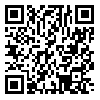Volume 33, Issue 1 (3-2024)
JGUMS 2024, 33(1): 44-55 |
Back to browse issues page
1- Department of Pharmaceutics, Faculty of Pharmacy, Guilan University of Medical Sciences, Rasht, Iran.
2- Department of Pharmacognosy, Faculty of Pharmacy, Guilan University of Medical Sciences, Rasht, Iran.
3- Department of Pharmacognosy, Faculty of Pharmacy, Guilan University of Medical Sciences, Rasht, Iran. ,shirinparvinroo@yahoo.com
4- Razi Clinical Research Development Unit, Guilan University of Medical Sciences, Rasht, Iran.
2- Department of Pharmacognosy, Faculty of Pharmacy, Guilan University of Medical Sciences, Rasht, Iran.
3- Department of Pharmacognosy, Faculty of Pharmacy, Guilan University of Medical Sciences, Rasht, Iran. ,
4- Razi Clinical Research Development Unit, Guilan University of Medical Sciences, Rasht, Iran.
Abstract: (617 Views)
Background Herb shops are important for preparing medicinal plants. Improper packaging can lead to contamination of these plants by various types of microorganisms, fungi and yeasts.
Objective This study aims to investigate the prevalence of microbial and fungal contamination in four plants from the Lamiaceae family in herb shops in Rasht, Iran.
Methods In this study, 15 samples from mint, rosemary, and wild mint plants, and 16 samples from lemon balm were collected. The samples were diluted and incubated for one hour, then transferred onto Tryptic soy agar culture medium for bacterial enumeration. The sabouraud dextrose agar culture medium was used to count total mold and yeast, while McConkey Broth culture medium was used for specific identification of Escherichia coli. Data analysis was conducted in SPSS software, version 16. For comparing the bacterial and fungal contamination levels in the plant samples with the Pharmacopeial quality standard values, the non-parametric Wilcoxon signed rank test was used.
Results Out of 61 plant samples, 59 (73.7%) were contaminated with bacteria, and 60 samples (86.6%) were contaminated with fungi. The number of samples contaminated with Escherichia coli was 27 (44.2%). The mean counts of bacteria and fungi in the plant samples were 3.39×105 and 6.3×105, respectively.
Conclusion The microbial contamination in most of the plant samples examined in this study is significantly higher than the permissible limit. It is necessary for health authorities to implement stricter policies for monitoring the quality of natural products in herb shops of Rasht, Iran.
Objective This study aims to investigate the prevalence of microbial and fungal contamination in four plants from the Lamiaceae family in herb shops in Rasht, Iran.
Methods In this study, 15 samples from mint, rosemary, and wild mint plants, and 16 samples from lemon balm were collected. The samples were diluted and incubated for one hour, then transferred onto Tryptic soy agar culture medium for bacterial enumeration. The sabouraud dextrose agar culture medium was used to count total mold and yeast, while McConkey Broth culture medium was used for specific identification of Escherichia coli. Data analysis was conducted in SPSS software, version 16. For comparing the bacterial and fungal contamination levels in the plant samples with the Pharmacopeial quality standard values, the non-parametric Wilcoxon signed rank test was used.
Results Out of 61 plant samples, 59 (73.7%) were contaminated with bacteria, and 60 samples (86.6%) were contaminated with fungi. The number of samples contaminated with Escherichia coli was 27 (44.2%). The mean counts of bacteria and fungi in the plant samples were 3.39×105 and 6.3×105, respectively.
Conclusion The microbial contamination in most of the plant samples examined in this study is significantly higher than the permissible limit. It is necessary for health authorities to implement stricter policies for monitoring the quality of natural products in herb shops of Rasht, Iran.
Review Paper: Research |
Subject:
Special
Received: 2023/08/22 | Accepted: 2023/11/15 | Published: 2024/04/1
Received: 2023/08/22 | Accepted: 2023/11/15 | Published: 2024/04/1
| Rights and permissions | |
 | This work is licensed under a Creative Commons Attribution-NonCommercial 4.0 International License. |





